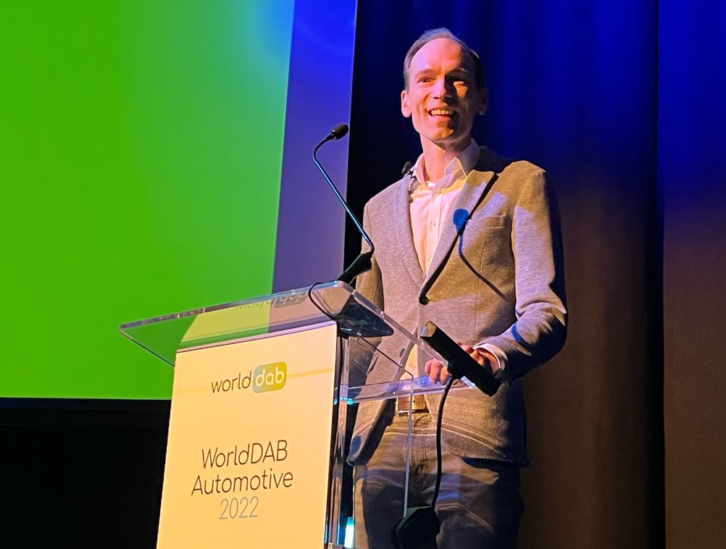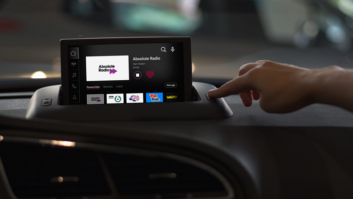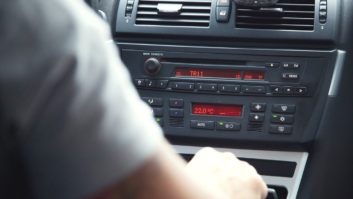The move towards IP-based in-car entertainment systems pose risks to radio, but also opportunities if the industry is bold enough to seize them. That was the message delivered by Martin Koch, Head of Platform Steering Infotainment at Volkswagen Group’s CARIAD, during his “The car market worldwide – an OEM perspective” presentation at the WorldDAB Automotive 2022 conference. It was held in person in London and online on June 22, 2022.
Is Radio’s Place Safe in the Car?
Martin Koch formatted his talk to cover three key topics, opening with a look at radio’s place on future dashboards. “I want to refer (back) to Radiodays Europe earlier this year,” he said. “David (Holecek, director of digital experience for Volvo Car Group) made a very interesting statement. He asked, they were thinking about ‘when can they get rid of the radio tuners in the car?’ They want to rely on IP radio only.”
“So what is the broader picture?” Koch asked. “Can we expect cars without radio receivers out in the market quite soon?”
He answered his own question by noting that DAB+ radios are mandated inside new cars in Europe, but AM and FM are not. Meanwhile, in other parts of the world, there are no rules preventing cars from being sold without radios, as part of their in-car entertainment systems.
So, is the radio in the car doomed? “I don’t know,” said Koch. At present, “I think the big car makers will not jump on that train very quickly because they sell cars in countries where there is no online connectivity.” But this could change if global online connectivity ever becomes a reality, he said.

Will Online Music Services Drive Radio from the Dashboard?
Martin Koch then tackled the impact of music streaming services on radio’s place on the dashboard. He noted that it makes more marketing sense to sell a car with a sticker that indicates it offers Apple Music, as opposed to a specific radio service.
However, it is the automakers’ inability to support dozens of in-car streaming platforms on the dashboard, due to their current closed technologies, that is the real threat to radio keeping its dashboard territory. “The target of the OEMs is to have only a few services with a very broad worldwide coverage,” he said. “And of course, Amazon Music and Apple Music are such candidates.”
[Related: “WorldDAB Speakers Predict Car Radios of the Future“]
The way for radio to win this battle is through its support for and participation in the Android Automotive platform, an all-encompassing in-car entertainment solution that benefits all stakeholders. “There’s a win-win situation for the customer because he has more choice.,” said Koch. “This is a win-win situation for the OEM because it’s not his burden to integrate all this stuff and maintain all this stuff in every region of the world. And, of course, it’s good for the service providers (radio) since they are on a similar level providing services directly to the customer … like in a normal app store on your smartphone.”
“So are the big techs killing the radio star?” he asked. “At the moment a little bit, but I see an opportunity.”
Will Android Automotive Deliver the Full Radio Experience?
Martin Koch’s final topic was the quality of the radio experience offered by Android Automotive. Right now he’s not impressed.
“The radio appearance was, let’s say, a little bit basic, he said. “[The] question is, is this by law? Is any car with Android automotive by law providing only a basic radio experience? And the truth is no. There is a very basic radio experience coming out of the box from Android Automotive, and of course the OEMs can do something about this. Some will do, some won’t.”
[Related: “NAB, EBU Emphasize Carmaker Relationships“]
Rather than rely on automotive OEMs to improve Android Automotive’s radio experience for listeners, “we took this as a challenge, or as an opportunity better to say, for WorldDAB,” said Koch. “So we teamed up with NAB and with Xperi and Ford and others in order to identify what are the gaps in Android automotive. We (then) put together a white paper handed over to Google and asked them to make these improvements.”
The goal is for Android Automotive to provide “all the specialties of DAB+, like slide shows and things like that … a very rich radio experience coming out of the box.”
Koch did not say if Google had accepted these recommendations or not. But he seemed optimistic. “Is Android automotive killing the radio star? Not really,” he concluded. “If we do it right from our side, then we can use this as an opportunity, and it’s not a risk.”







